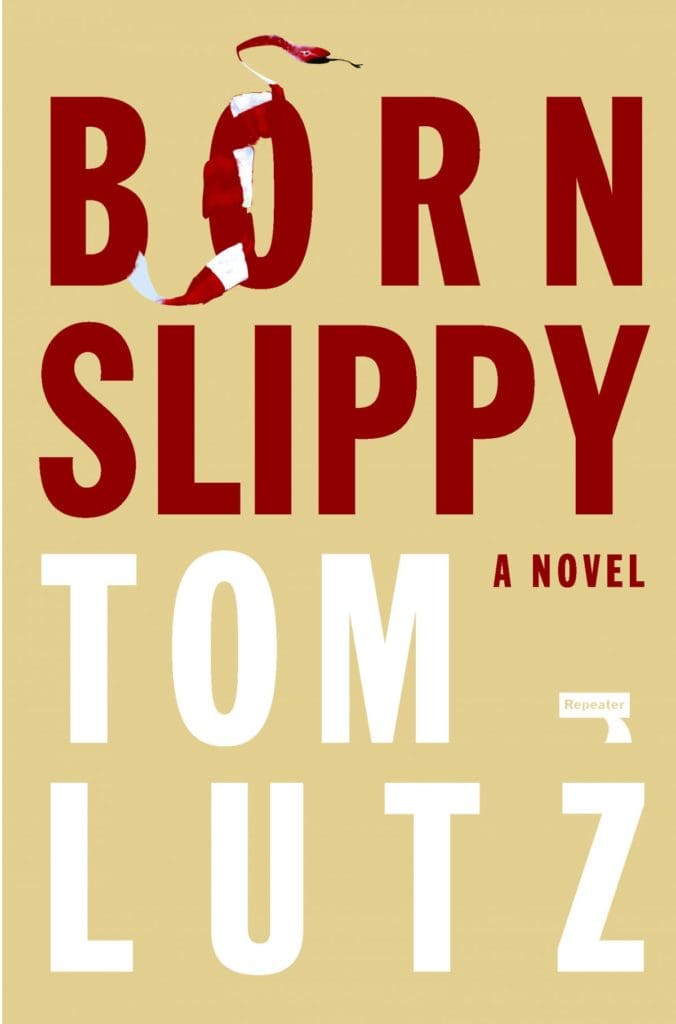With great guilty pleasure I left off reading A Journal Of The Plague Year by Daniel Defoe and picked up Born Slippy (310 pages; Repeater Books) by the critic and scholar Tom Lutz. This is Lutz’s first novel, and on show are the wild and woolly qualities of the best first novels, I am happy to report. There is no bubonic plague to drive the narrative and to provide the agar within which we observe human behavior, no. Instead, there is in Born Slippy a character named Dmitry, a one-man plague. Frank, the novel’s central intelligence, regrets many, many times his inability to check Dmitry, to keep his infectious immorality contained, isolated, particularly from himself. “Frank, queasy, knowing Dmitry would mock anything he said and up the ante, said nothing.” Indeed, Frank is full of extravagant regret, and this is yet another layer of pleasure one takes in reading Born Slippy, the ever increasing contagion of Frank’s straightforwardly honest and ambitious work-a-day life as a building contractor. He does not aspire to the kind of fortunes written up in Forbes, and yet by novel’s end it has been thrust upon him, but not without an opera’s worth of his own complicity. One groans happily as Frank agrees to yet another “small favor” Dmitry is asking for.
I am not much bothered by being told what happens in a movie or book. The sentence to sentence intelligence of the prose is a novel’s mitochondria for me, and on page 1 of Born Slippy, one reads that Dmitry is responsible for a building being blown up, a branch of Credit Lyonnaise in Taipei, killing hundreds of people. The novel rolls back time and on page 2 an eighteen-year-old Dmitry Heald “had come to America—in his Liverpudlian accent it sounded like Ameriker—trailing whatever dusty innocence he might still have had, looking for a little work, wanting to earn some quick money and then wander around for the rest of the summer doing a low-rent grand tour, reeling through the Big Lonesome West, as he called it.” In other words, Dmitry Heald arrives on American soil already deeply immersed in mythology, romanticism, notions of a wide open frontier, ready for the taking. And he will hell-bent take it, and by any means available. He is a brilliant character, brilliantly written, and thank God a construction in language, but therein lies yet another muscular pursuit or meditation in this novel, the role of literature in these characters’ lives, its efficacy—perhaps treacherous—to drive their ambitions, to install them with scene-stealing rationales, and perhaps to leave them unchecked by any greater moral scrutiny.
I risk in those last sentences suggesting some of the dull wood of the pulpit, but there is none in Born Slippy. Frank Baltimore is an autodidact; he has never attended university, and perhaps because of this, carries the burden of self-doubt, which might in turn be called a moral compass. He is a voracious reader, Marx and Nietzsche, Hawthorne and Wharton and Cather and James. How Frank’s psyche, his conscience, is outfitted by his reading, and rather deliciously eroded by opportunity, otherwise known as reality, is the reason to read forward, and yet another aspect that makes this novel unputdownable.
Frank “had had a pathological pit of wanderlust since he was a kid, stoked by reading Conrad and Melville and García Márquez and Hemingway and Graham Greene, but back then he assumed that this was the way the imagination worked. It was called a dream because it wasn’t ever going to become real.” Oh, how differently the imaginative world serves Dmitry. Frank presumes to tutor him, to bring this callow youth into some kind of proximity with the great thinkers and writers of the canon, and indeed, Dmitry, ever tenacious of language, its power, is as avid a student as Frank could wish, and as deeply, lickingly subversive as the fire that burned the grand library of Alexandria. There are no stops within Dmitry, either physical or intellectual, and once he is fantastically stratospherically wealthy, he takes up Brazilian jiujitsu. The writing of these championship bouts is extraordinary, and juijitsu serves extraordinarily well this novel and its world of global finance as a vehicle to get at a world in which few blows are struck and yet people go violently down for the count.
Born Slippy is published by Repeater Books of London, whose operating principle or editorial manifesto ends with “abstention is not an option: we are alive and we don’t agree.” May readers allow this to be their ethos, their stance, at least for the time it takes them to read this novel. “There are no innocent people,” Dmitry says, and perhaps uncomfortably, Dmitry deserves the last word.

